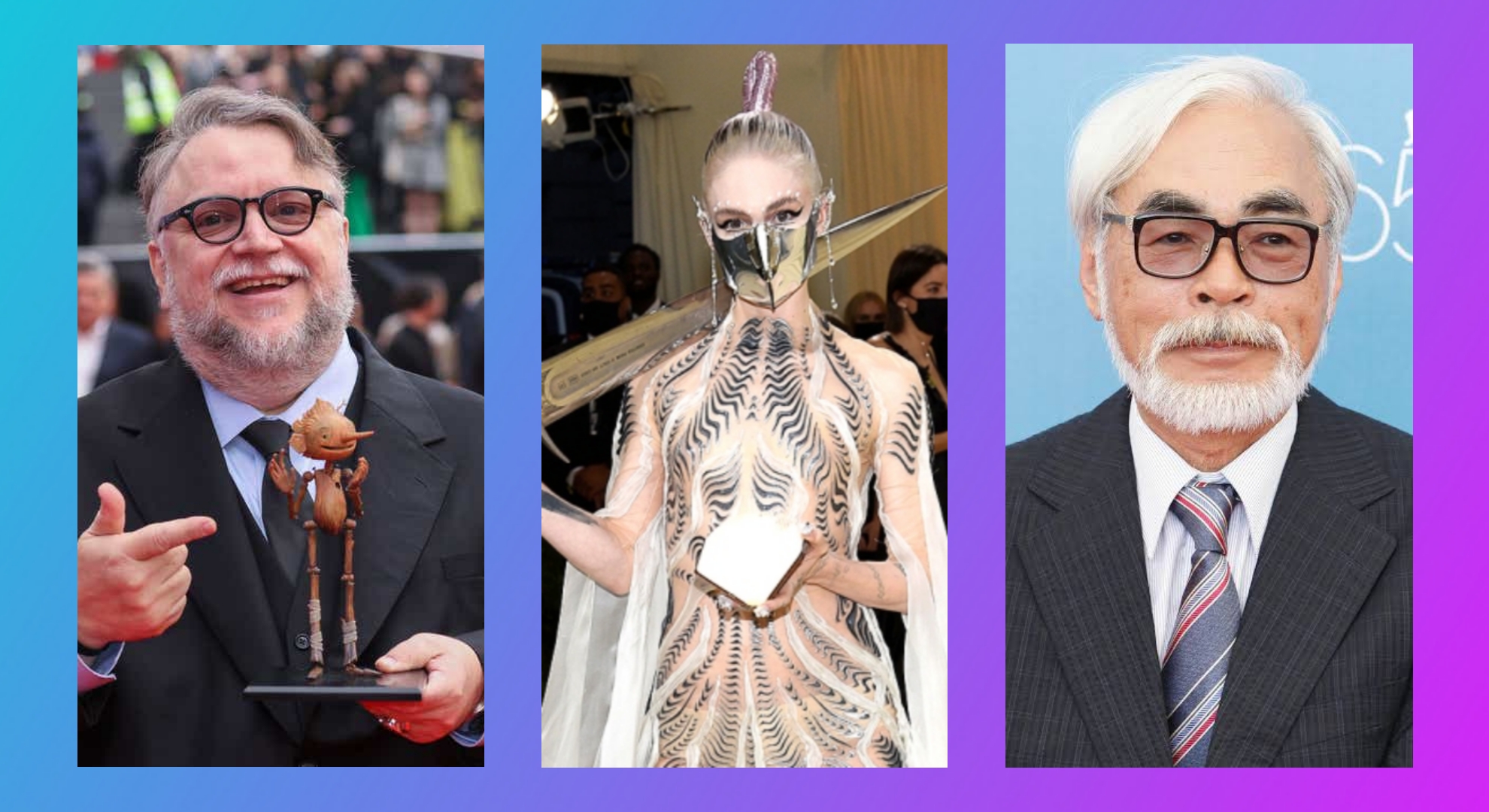Social media platforms are swarmed with artificial intelligent (AI) generated images and artworks as of late. Wherever you look, you would see people using this technology to transform their photos into artsy illustrations.
As AI art is becoming more and more popular, the discourse regarding the controversies surrounding this technology is also getting louder than ever, with many prominent figures joining in on the conversation.
From film directors and comic book artists, to singers and media personalities, let’s take a look at how they weigh in on the controversy that is the growing popularity of AI art.
The current anti-AI art team:
-Guillermo deal toro
-Hayao Miyazaki
-like every artist on this websiteThe current pro-AI art team:
-grimes
-a guy in Ohio that paid 8 dollars for twitter— kenzie (@pk_kenzie) December 16, 2022
Exhibit A: Those who expressed concern, disinterest and slammed AI art
Hayao Miyazaki
Japanese animation legend and Studio Ghibli co-founder Hayao Miyazaki first expressed his thoughts about the use of artificial intelligence in animation films.
In late 2016, a few members of Dwango sat down with Miyazaki and Studio Ghibli producer Toshio Suzuki and presented a program that used AI-generated methods of locomotion as a potential tool to create animation films. There, the forms of movement seen from the humanoid form were “various shambling crawls using hips, neck, and shoulders,” making the human look more like a zombie.
After seeing the demo, Miyazaki shared that it reminded him of his friend who had a disability, telling the Dwango’s staff that he couldn’t “watch this stuff” and he was disgusted.
“Whoever creates this stuff has no idea what pain is whatsoever. I am utterly disgusted. If you really want to make creepy stuff, you can go ahead and do it,” Miyazaki said.
The legendary filmmaker went on to tell how he wouldn’t incorporate this kind of technology in his film, even calling it “an insult to life itself.”
“I would never wish to incorporate this technology into my work at all. I strongly feel that this is an insult to life itself.”
When Suzuki asked the presenters about their goal, the latter said was to “create a machine that draws pictures as humans do,” to which Miyazaki muttered: “I feel like we are nearing the end of the times. We, humans, are losing faith in ourselves…”
Guillermo del Toro
Among the many personalities who have been very vocal about having no interest in the growing popularity of AI art is Academy Award-winning filmmaker Guillermo del Toro, who’s known for helming Hellboy (2004), Crimson Peak (2015), Nightmare Alley (2021), and Pinocchio (2022).
In an interview with Decider, the Pinocchio director discussed the delicate process of creating the recently released stop-motion film Pinocchio (2022). When asked about his thoughts on AI art, del Toro expressed no interest in the trend.
On the subject of #AIart, Guillermo del Toro (@RealGDT) says he will always "consume, and love, art made by humans." pic.twitter.com/3z4XoqXF0Q
— Decider (@decider) December 9, 2022
“I think that art is an expression of the soul. At its best, it encompasses everything you are. Therefore, I consume and love art made by humans. I am completely moved by that,” del Toro said. “I am not interested in an illustration made by machines and the extrapolation of information. It can never capture a feeling, or a countenance, or the softness of a human face, you know?”
del Toro also quoted Miyazaki and echoed the same sentiment that AI art is “an insult to life itself.”
He added: “Certainly, if that conversation was being had about the film, it would hurt deeply. I would think it, as [Hayao] Miyazaki says, ‘an insult to life itself.’”
Mike Mignola
Comic book artists also took a stance against the emergence of AI art, including Mike Mignola. Mignola is famously known for creating the Hellboy series, a series that focused mainly on Hellboy, a red-skinned demon, and his struggle against his demonic nature.
I would think this goes without saying, but just in case there is any confusion– pic.twitter.com/DhF3kv92cA
— Mike Mignola (@artofmmignola) December 14, 2022
In a tweet, Mignola made clear his thoughts about the growing popularity of AI art. The comic book artist has posted an image that says “No to AI-generated images,” and accompanied it with the caption: “I would think this goes without saying, but just in case there is any confusion—.”
Dave Rapoza
Mignola isn’t the only one in the industry who partakes in the “No to AI-Generated Images” protest on Twitter. Comic book Steve Lichman’s co-creator David Rapoza also voiced out his opinions about the current trend. While Rapoza wasn’t “entirely against AI,” he pointed out that artists should be given an option whether to give licensed packs of their artwork at a just and fair rate with certain conditions to the AI companies.
this is what they deleted. what? pic.twitter.com/0aGc9yk8B7
— Dave Rapoza (@DaveRapoza) December 14, 2022
“I think artists should just be compensated for the use of their work,” Rapoza said in a tweet thread. “We should have the option to give some sort of licensed packs of artwork to these companies at a fair rate with limited use.”
He then explained the effects of stealing and using the artists’ works without consent can “f*ck them,” which is happening right now. “AI can coexist with artists working. It just needs to be a fair deal where they give consent,” Rapoza added.
by taking artwork without consent from these artists and having their work literally be collaged into new artwork without any compensation is actually fucking them at the moment – AI can coexist with artists working, it just needs to be a fair deal where they give consent
— Dave Rapoza (@DaveRapoza) December 14, 2022
Lois van Baarle
Netherlands-based visual artist, illustrator, and character designer Lois Van Baarle, also known as Loish, also shared her take on the whole AI art controversy. Like other comic book artists and filmmakers, Loish is against AI-generated images as her works are used without her consent.
Link: https://twitter.com/loishh/status/1603434379665104896?t=1NkWYgO0c04MhCuypxGpKw&s=19
“I get zero compensation for this, even though these image generators cost money to use, and are a commercial product,” she tweeted.
Loish continued to slam the trend, saying that image generators have “no inherent sense of what is respectful to artists.”
“My art is literally being fed into these generators through the datasets, and spat back out of a program that has no inherent sense of what is respectful to artists,” she said. “Until there is an ethically sourced database that compensates artists for the use of their images, I am against AI art.”
“I also think platforms should do everything they can to prevent scraping of their content for these databases,” the digital artist added.
Alex Aceves
Publisher Holiday House associate editor Alex Aceves has spoken out about how she had received a picture book that contained AI illustrations to be published. She then told the public that she would automatically reject all manuscripts that included AI-generated images.
I have very few submission “rules”; if your MS shows promise, I legit don’t care if you addressed me as “sir or madam” in your cover letter. but I can safely say this is a firm one: I will auto-reject any submission that comes to me with AI art, period.
— Alex Aceves (ah-SEV-ess) (she/her) 🇲🇽 🩷💜💙 (@alexaace) December 15, 2022
“If your [manuscript] shows promise, I legit don’t care if you addressed me as “Sir or Madam” in your cover letter,” she said in a thread. “But I can safely say this is a firm one [rule]: I will auto-reject any submission that comes to me with AI art, period.”
Brandee Barker and Megan Fox
Other than the issue of how companies that generate AI images are stealing the artists’ works without consent, there are other alarming problems with using it: AI has sexualized women.
This was observed by global human rights activist Brandee Barker upon using Lensa, an AI app by Prisma Labs that generated stylized avatars and selfies. In a tweet, Barker shared a few photos she got from the app which seemed to hypersexualize her.
Is it just me or are these AI selfie generator apps perpetuating misogyny? Here’s a few I got just based on my photos of my face. pic.twitter.com/rUtRVRtRvG
— Brandee Barker (@brandee) December 3, 2022
“Is it just me or are these AI selfie-generator apps perpetuating misogyny?” Barker tweeted.
Barker wasn’t the only one who raised their concerns about the sexualization of women in these AI apps. Megan Fox also called out Lensa Images for her “sexual” and “naked” AI-generated avatars.
View this post on Instagram
Anisa Sanusi
Aside from women being sexualized, AI apps, such as Lensa, appeared to be racially biased and generated random Asian girls.
Game developer Anisa Sanusi has spoken out about this issue, saying she wasn’t impressed by the generated images Lensa app spawned, which made her look Chinese.
Tried out the Lensa AI app and fed 20 photos of myself, and I have to say it really struggles with Asian faces. My results were skewed to be more East Asian and I’m absolutely not impressed. pic.twitter.com/WnyLKXQT8K
— Anisa Sanusi (@studioanisa) December 3, 2022
“Tried out the Lensa AI app and fed 20 photos of myself, and I have to say it really struggles with Asian faces,” Sanusi said. “My results were skewed to be more East Asian and I’m absolutely not impressed.”
The Malay game developer added: “My features sit between the East and South Asian spectrum, and seeing myself look far too Chinese is giving me a weird sense of dysphoria.”
Being ethnically Malay, my features sit between the east and south Asian spectrum, and seeing myself look far too Chinese is giving me a weird sense of dysphoria pic.twitter.com/TbYAQ2pfUP
— Anisa Sanusi (@studioanisa) December 3, 2022
Exhibit B: Those who use and are supportive of AI art
Grimes
Perhaps one of the artists who has long been supportive of artificial intelligence is Canadian musician Grimes. Grimes, who’s also known as Twitter czar and Tesla CEO Elon Musk’s former partner, has been using AI throughout her career.
Back in 2018, Grimes dropped a track about an AI Girl Group Propaganda machine aptly titled “We Appreciate Power.” In 2020, the musician released “AI Lullaby,” a song that is “scientifically engineered to help children and adults sleep and nap better.” The track featured a soundscape generated by Endel Pacific technology. She followed this up with a launch of an AI girl group called NPC in 2021 with a debut track titled “Love is a Drug from God.”
In a 2019 interview, Grimes genuinely thought that artificial general intelligence (AGI) was going to be “so much better at making art than us.” “Once there’s actually AGI, they’re gonna be so much better at making art than us,” she said. “Once AI can totally master science and art, which could happen in the next 10 years, probably more like 20 or 30 years.”
Recently, the artist has also expressed interest in welcoming AI artists into the creative world. In a tweet, Grimes wrote: “I relished the final days of being the only species who create art, but I’m excited to welcome our AI friends into the beautiful journey of creation with us.”
I relished the final days of being the only species who creates art but im excited to welcome our ai friends into the beautiful journey of creation with us. I see a lot of cynicism but it’s a privilege to live thru such an utterly historic moment 🤖 https://t.co/qkr65geoNk
— 𝖦𝗋𝗂𝗆𝖾𝗌 ⏳ (@Grimezsz) August 23, 2022
“I see a lot of cynicism, but it’s a privilege to live through such an utterly historic moment,” she added.
Jazza
Australian YouTuber and illustrator Jazza is very much known for his art content, which includes tutorials, challenges, and animations. However, some of his fans were very disappointed upon knowing that the artist is supportive of this technology.
In a recent video he uploaded, Jazza spoke out about his stance on the controversy surrounding AI art, saying that people can benefit from the technology and that “AI art is art.”
https://youtu.be/TOfEJyWNsZQ
“I believe AI art is art because humans are using it, and because it’s referencing humans, it’s built by humans,” Jazza said.
“Just because people who aren’t trained artists are using it and because it’s going through a robotic way of thinking and analyzing, it doesn’t mean that it hasn’t got a potential to be art,” he added.
He went on to explain that saying “AI art is theft” isn’t the “constructive approach” when reviewing the technology. He believed that AI art can solve the debates surrounding the controversies of the technology itself.
“I think it’s meaningful and useful to use AI as an art-making machine because art makes people think, feel, and talk and engage about the human experience,” Jazza said. “AI can be used to help us navigate this next stage, and we can benefit from engaging in that with each other.”
He then ended his clip with a note that encouraged his viewers to “earnestly look at AI, its impact, and how to navigate that [impact] moving forward.”
Jonathan Young
Independent musician Jonathan Young, on the other hand, sees AI art as “not inherently wrong.”
In a thread, Young even explained how AI art had helped him “to express me more fully.” He then went on to essentially promote technology as a positive tool for creating music. This is evident in his replies to other users, where he went as far as saying: “Real artists arguably ‘steal’ styles just as much as an AI does.”
Sure, but the concept of “art credit” is a very sticky one. Am I obligated to credit bands that heavily inspired me during my own songwriting? Where is the line between derivative and inspirational. Real artists arguably “steal” styles just as much as an AI does
— Jonathan Young (@JonathanYMusic) December 1, 2022
“Most of you aren’t ready to unpack the concept that human creators don’t have a monopoly on things like artistic symmetry or musical harmony,” Young wrote. “So it stands to reason that computers could eventually create art that’s objectively amazing, and we need to just be okay with that.”
most of you are not ready to unpack the concept that human "creators" don't have a monopoly on things like artistic symmetry or musical harmony, so it stands to reason that computers could eventually create art that is objectively amazing. and we need to just… be ok with that
— Jonathan Young (@JonathanYMusic) December 1, 2022
Christopher Paolini and Tor Books
Now while American author and screenwriter Christopher Paolini and publisher Tor Books didn’t explicitly express their support for AI art, the two were under fire and slammed for the AI art used in the cover of Paolini’s new book, Fractal Noise, which is set to come out in May 2023.
Hey @torbooks why tf are you using AI art on your covers pic.twitter.com/Yam2bkMTy5
— Corey Brickley Illustration. Justice for Palestine (@CoreyBrickley) December 9, 2022
In a post, Tor Books has spoken up about the use of AI art in Paolini’s Fractal Noise.
“Tor Books designed the cover for Fractal Noise by Christopher Paolini. During the process of creating this cover, we licensed an image from a reputable stock house,” they explained. “We were not aware that the image may have been created by an AI. Our in-house designer used the licensed image to create the cover, which was presented to Christopher for approval.”
Even though Tor Books and Paolini now knew that the book cover was created by AI, they explained that they would “move ahead with our current book cover” due to “production constraints.”
— Tor Books (Check Mark) (@torbooks) December 15, 2022
To put it simply, readers will probably see AI-generated artwork in bookstores next year.
Justin Roiland
Best known as the co-creator and one of the voice actors of Rick and Morty, animator and director Justin Roiland has apparently used it in his newest project, High on Life, a first-person shooter video game.
In an interview, Roiland, who also happened to be the CEO of Squanch Games, confirmed the use of AI art and AI voice acting in the said video game. He then went on to explain how powerful Midjourney AI was and how it helped him to “add some finishing touches” in High on Life.
“It makes the world feel like a strange alternate universe of our world,” Roiland told Sky News. “And we used it to come up with weird, funny ideas.”
Roiland also noted the potential of AI which can help to create accessible content. “I don’t know what the future holds, but AI is going to be a tool that has the potential to make content creation incredibly accessible,” Roiland said.
These are just some of the media personalities and artists in different industries’ hot takes regarding AI art. Now, we’re wondering, where do you fall in this issue?
Other POP! stories that you might like:
AI generated art is problematic and should never be supported by anyone
Pokémon will continue on their story without Ash and Pikachu
The memefication of ‘Barbie’: ‘Barbie’s first trailer sets social media abuzz



